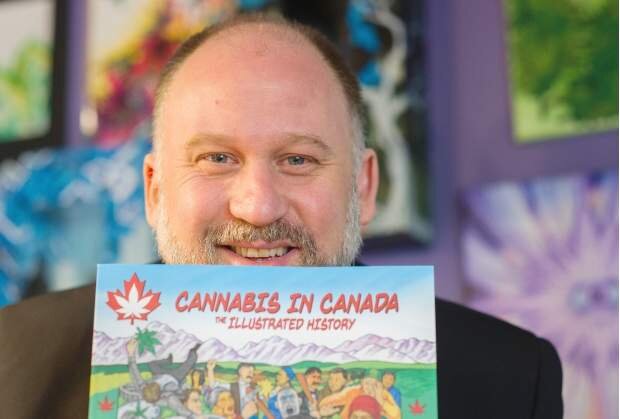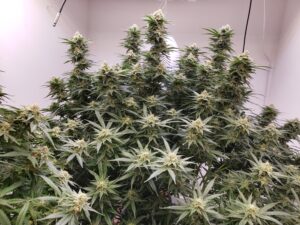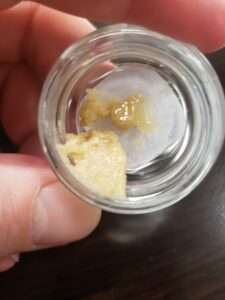Dana Larsen is a legend in Canada for his activist and non-profit work. He has started multiple non-profit organizations dedicated to the rights and access medical cannabis for patients, and has been a pioneer for cannabis activism since we were young. Dana served ten years with the world renown Cannabis Culture magazine as an editor and is the former vice president of the Canadian Association of Cannabis Dispensaries.
On top of being an author of several amazing books, he has also inspired many people to speak up about the injustices cannabis users have faced throughout the years and has demonstrated time and time again his dedication to the cause.
We’ve been aware of Dana for nearly a decade as he’s traveled across Canada, working with cannabis clubs, groups, organizations and businesses to lobby for rights. The one common theme. He doesn’t hide behind an online moniker, or alias, and that’s something that we think deserves attention. Dana has been on the front lines of cannabis activism putting his personal freedom at risk time and time again for access to quality cannabis at reasonable rates. He educates on safe access to cannabis and promotes responsible consumption, even when that means ethics don’t align with regulation.
Now that the Cannabis Act has settled in across Canada, we wanted to sit down with Dana to talk about some of the issues at hand, and what we can do to change them.
Welcome to a sit down with cannabis activist, entrepreneur and connoisseur Dana Larsen.
Dana, we want to start by saying we are huge fans and we’ve followed you for nearly a decade. You’ve done a massive amount for the legal cannabis movement in the past.
Do you feel the system we have in place now does all of the work that you and other activists have put in justice, or is our version of legalization what we should be aiming for?
Thanks for giving me this opportunity.
The legalization we’ve got so far in Canada is a real mixed bag. The good part is that there will be around 60,000 fewer arrests each year for cannabis possession. That makes a real difference in people’s lives. In terms of numbers, the vast majority of cannabis enforcement was directed at personal possession, so this is significant.
There’s also good news in that Canadians can grow four plants per household. Yes, four plants are an arbitrarily low limit, and sadly two provinces have banned home growing, while others like BC have made it very difficult to grow at home. But this is still a big step forward and something we can be proud of.
The problems are mainly around cultivation and sale. The rules and penalties are such that it is very difficult to become a legal grower or producer, and the bureaucracy and taxes are such that it’s difficult to provide a quality product at a good price. There has been the appearance of favoritism and scaminess when it comes to how licenses have been given out, and who has been getting them. It seems like political insiders and retired police officers have been cutting to the front of the line.
The reality is that “legalization” was a breakthrough, but hardly the end of our troubles as cannabis users, growers, and sellers. As activists, we still have a lot of work ahead.
“The reality is that legalization was a breakthrough, but hardly the end of our troubles as cannabis users, growers, and sellers. As activists, we still have a lot of work ahead”
The culture in Canada surrounding cannabis has grown massively in recent years due to legalization.
How do you feel this has affected the rest of the world and do you think Canada is making strides to change the global view on cannabis?
Canada is a beacon of hope for the global cannabis culture. All of the world, people look at Canada as an example of sane cannabis policies. While we are upset as Canadians over many details in legalization, to people in many other countries, all they know is that Canada legalized marijuana and that they should do something similar in their nation. This is important to triggering worldwide reform.
Currently, there is a large portion of the cannabis market that isn’t interested in reading about or talking about cannabis, and fail to join in on the many important marches/rallies across the world.
What do you think we could do to help increase support for the cannabis movement inside our own community?
The reality is that many people don’t get involved politically unless it is an issue that affects them very directly. In many cases, people become a cannabis “activist” when they or someone they love discovers they have a serious medical need for cannabis, or when they or someone they love gets arrested or punished over cannabis. Then the importance of this issue really hits home.
I am a marketer by trade and have been in the industry for some time now. One of the things I’ve noticed about the cannabis industry is the lack of effective messaging to consumers specifically in the activism area. These messages typically try to shove a particular message in your face and most people aren’t too receptive of these kinds of techniques. However, you have your own way of promoting and communicating the benefits of cannabis that really resonates with people.
As an activist since day 1, what mediums have helped you convey your message the best and allowed you to encourage others to consider learning from you?
Early on I decided that my communications strategy was going to be less about trying to convince and win over haters, and more about encouraging people who already support our cause to get vocal and active. There are many people who will never be convinced about the benefits of cannabis, it’s better to ignore those people and instead activate our side. You don’t need to have majority support. A passionate and dedicated minority can make change happen if they are committed to their cause.
As with many other issues, the real way people change their minds isn’t through logical arguments and analyzing facts. People change their minds when the issue affects them personally. How many politicians only came out in support of gay marriage after their own child or another loved one came out as gay? In a similar manner, when your child comes out as a cannabis user, or perhaps a loved one is using cannabis for medical purposes, your perspective can change in a way that otherwise wouldn’t happen.
Actions speak louder than words. You’ve faced incarceration multiple times because of your dedication to promoting the benefits of cannabis .
How would you say this ideology has influenced the spread of your message and the benefits of cannabis?
Well I’ve been arrested and jailed once for cannabis, which was for giving away free cannabis seeds at an event in Calgary in 2016. In the end a judge dismissed those charges. I’ve always tried to frame my civil disobedience to break the laws in a way that is unlikely to result in arrest. Finding the angles where we could chip away at the monolith of prohibition.
I do think that civil disobedience has been our most successful tactic when it comes to changing the cannabis laws, and we will need more civil disobedience to get better laws in place.
In order to be a licensed cultivator or dispensary owner, you need a squeaky clean criminal record. This is kind of ironic, as the ones who originally pushed the government and lobbied for legal cannabis, are the ones who received criminal injunctions, and are now barred from participating in the legal system.
Can you touch on this, and how do you feel about some businesses operated, or owned by the same individuals who originally profited from prohibition, either on the regulatory or enforcement side?
In theory, I am in favor of police quitting their jobs to grow cannabis. But this really needs to come with an apology and recognition of the harm done by prohibition and the police who enforce it. It is gross when people who devoted their lives to demonizing, harassing and arresting cannabis users are the first ones to be growing legal cannabis, while still denigrating and attacking the cannabis growers and cannabis culture. This is totally backward to what legalization should be about.
I believe legalization should have included provisions where a portion of cannabis taxes was directed back into reparations for those who were imprisoned over cannabis, to begin making right the harms of prohibition.
“I do think that civil disobedience has been our most successful tactic when it comes to changing the cannabis laws, and we will need more civil disobedience to get better laws in place”
A lot of your work in regards to your dispensary, CannabisDispensary.ca, and your activism throughout the years has always referred back to the medical side of cannabis. The guidelines for medical cannabis and recreational cannabis are all over the place currently, and that often leads to loopholes. These loopholes have led to a large amount of medical-grade cannabis finding its way to a variety of mail-order marijuana sites that compete with legal government-regulated dispensaries.
Can you touch on the overlap in medical and recreational guidelines, and how you think this could be improved? Or does this “grey area” in the system create more opportunities for business owners and consumers alike?
Loopholes are good when they weaken the evil of prohibition and allow more cannabis access. I do a lot of work in the “grey area” and ideally, over time, the shade of grey becomes lighter and lighter. Ultimately, a properly regulated and fair legal system wouldn’t see people seeking out loopholes because there would be no need. Legalization should mean a significant drop in prices which eliminates so many of the issues around cannabis.
Right now medical cannabis is harder to access in Canada than “recreational” cannabis, which is an absurd situation. Also, someone with a prescription for cannabis should not be paying GST or other taxes. Plus some doctors are charging hundreds of dollars to write a medical recommendation for cannabis. None of this is about putting patients first.
What do you think the future is like for cannabis in Canada? What do you think we could do to reduce the legal barriers holding many cannabis cultivators and dispensaries back and encourage responsible business owners to enter the market?
It’s going to be a huge effort still. We need to work on the cities that are refusing to allow cannabis shops. We need to work on the provinces that have put in restrictive cannabis laws. And we need to work on the federal government to rewrite the Cannabis Control Act.
I expect we’ll see some success in the courts over the coming years as we work to reshape these laws.
Could you give the federal government 3 actionable tips to help improve the Cannabis Act?
1. Look at cannabis reform through a lens of human rights and social justice, not profits and punishments. Begin by acknowledging the racist and ignorant origins of prohibition.
2. Remove all taxes from medical cannabis, and ensure that medical users always have full access to a wide array of affordable cannabis medicines.
3. Build in a system of reparations for those with criminal records and jail time from cannabis convictions, to help undo the harm caused by decades of vicious prohibition.
Give a breakdown of your current projects and everything you’re involved with right now.
All of these are non-profit societies which I am a director of, and which do nationwide mail order.
The Medicinal Cannabis Dispensary: CannabisDispensary.com
The Medicinal Mushroom Dispensary: Psilocybe mushroom microdoses for medical users. MushroomDispensary.com
MJ Creams: Cannabis-infused creams and salves. MJcreams.ca
Pothead Books: My cannabis-themed novels and comics. PotheadBooks.com
If anyone wants to donate to the cause or get in touch, where do they reach you?
My personal website is DanaLarsen.com
Last words for our Extract readers?
If you’re reading this it’s because cannabis and entheogens have improved your life. I encourage you to give back, do something every single day to spread the word, educate your community, and change these laws.













